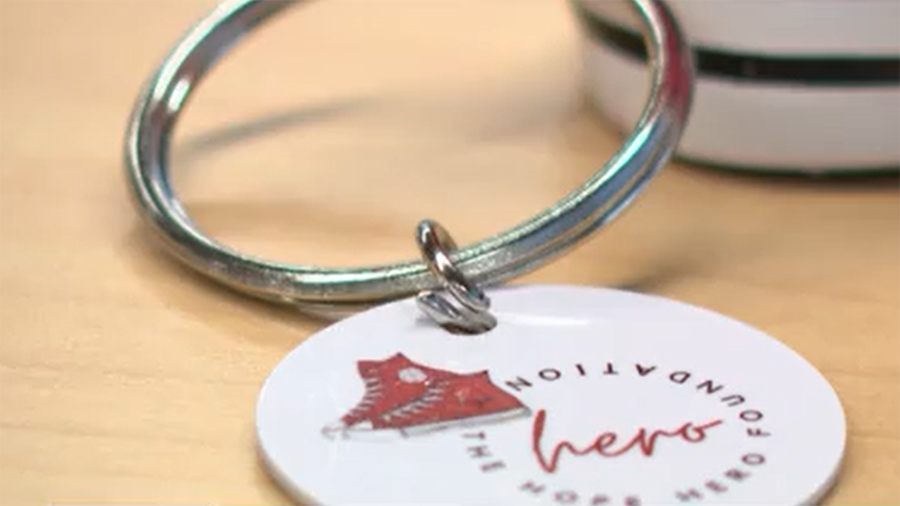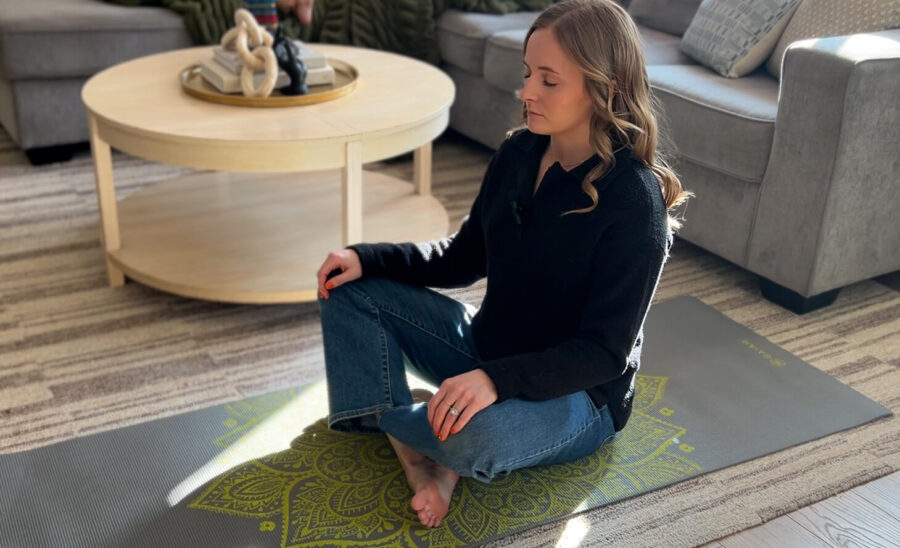The Quiet Crisis: How first responders will help fill the trauma-informed therapy gap
May 17, 2023, 10:11 PM | Updated: May 18, 2023, 8:58 am
SALT LAKE CITY — Tens of thousands of first responders put their life and emotional wellbeing on the line every day in Utah. But who cares for them when their own mental wellbeing is on the line?
There are not enough trauma-informed therapists in Utah who understand the weight placed on first responders to meet the growing demand for therapy.
One Utah legislator proposed a creative solution to this quiet crisis. The new law, passed this year, provides scholarship funding to any first responder who wants to enroll in school to become a therapist.
First Responder Stress on Home Life
Mike Berg, former chief of police in Parowan, is a protector in every sense of the word. His wife of 25 years, Melinda Berg, said in their early days of marriage, he would often wake up in the middle of the night just to check on her.
“He would just wake up, look over (and say) ‘Are you OK?’” she recalled. “To me, it was like, ‘Aww OK, a protector! That was sweet! “OK, I’m good, I’m good, go back to sleep.’”
But over the years that followed, she admits the strain of a high-stress job has also brought challenges to their home life.
Mike Berg used to think: “If I spent five minutes in my truck at the end of my shift and just leave it all there (and) go in — I’m a normal dad.”
“He thought that he was protecting us by not bringing it home. He would not talk about any of it!” Melinda Berg explained.
His family didn’t know which version of dad would walk through the door each night.
Mike’s oldest daughter, 22-year-old Madison Nunley, is married and doesn’t live at home anymore. She remembers the feeling well, though.
“We’re kind of all walking on eggshells, right? Like what kind of mood is he in? What can we do to make him happy? Or, you know, why doesn’t he want to spend time with us,” she recalled.
“They could just tell that I was gonna isolate for the night,” Mike Berg said.
“He was there, but not,” Melinda Berg said. “At times, I was just like, you know, my husband might as well be overseas with the military at this point.”
His own home at times was overwhelming.
“As kids, they couldn’t play because the noise would drive me crazy — just the common noise of a home,” Mike Berg remembered.
Another trigger was coming home to a messy countertop.
Mike Berg said for a long time, he believed he had a perfect marriage.
“We have not argued more than three or four times in 20 years and I believed that,” he said.
But his wife simply said the arguments weren’t worth it.
“It was easier to just not fight him… because with most cop personalities, you won’t win,” Melinda Berg said.
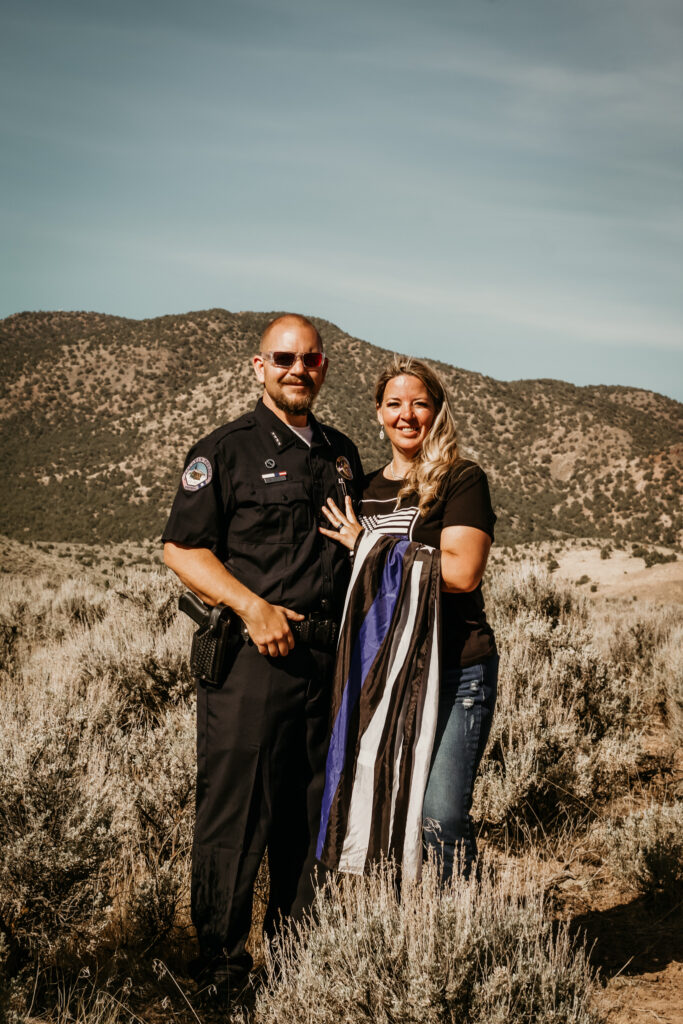
Mike and Melinda Berg have been married for 25 years. For a long time, Mike believed he had a perfect marriage. But after going to therapy, he realized his wife wouldn’t argue with him because she said it wasn’t worth it. Therapy has helped them learn to communicate better and has given them tools to deal with the stress that comes from being a first responder. (Mike Berg)
Jeffrey Denning, a retired Salt Lake City police detective and associate clinical mental health counselor, said these stressors are real.
“The stresses at work come home,” he said.
A 2018 survey by the Ruderman Family Foundation reports officers witness 188 critical incidents in the lifetime of their career. And a 2015 study published in the Journal of Mental Health reveals first responders are 25 times more likely to develop post-traumatic stress disorder than the average citizen.
“You have the smells and you have the scenes and you hear the cries that will not ever leave your ears — the piercing and haunting cries of mothers who walk out and see their children dead,” Denning described.
Without help, many first responders turn to negative coping skills.
“It can lead to drinking alcohol, or escaping, or forgetting, or avoiding,” Denning said.
Or worse.
“When the trauma gets so much, you feel like you’re drowning, you feel like there’s no way out,” Denning described.
Last year, 50 more police officers died by suicide nationally than in the line of duty. The FBI released a report last week showing 118 officers died in the line of duty in 2022, while 168 officers died by suicide, according to Blue H.E.L.P. — an organization that tracks voluntarily reported deaths by suicide.
First responder suicides are historically poorly tracked in both Utah and across the nation, but the newly formed Law Enforcement Suicide Data Collection launched by the FBI at the beginning of the year is seeking to change that. The new law requires the FBI to record anonymous data on police suicides. The agency published its first report in March.
While more first responders are now willing to try therapy, their stories are often beyond what many therapists have encountered.
“Police officers and firefighters have reported to me and said, ‘Hey, you know, I went to a therapist once and I started telling them about a bad car crash with a death or infant death or shooting, and the therapist would fall apart in tears and I would have to comfort the therapist,'” he said. “And then they would tell me, ‘I’m never gonna go to therapy again. It was a horrible experience.'”
That was the case for Mike Berg.
“She stopped it and said that … this wouldn’t work out and she referred me to a different therapist,” he said.
Since distrust between first responders and therapists is already high, Denning said stories like these often dissuade others from ever giving therapy a chance.
“If they talk to the wrong person, sometimes that can be devastating,” he said.
A New Solution
These stories also highlight a dire need: there aren’t enough trauma-informed therapists in Utah who understand the weight placed on first responders each day.
In southern Utah, there are even fewer.
“I think that there’s 15 or 20 probably that would be culturally competent to work with a first responder, and there’s what, 1,800-3,000 cops down there?” Mike Berg said.
That’s when Rep. Ryan Wilcox in Weber County decided to turn to first responders themselves. This year, he sponsored legislation providing a scholarship of up to $24,000 to any Utah first responder who wants to become a clinical mental health therapist. It passed with ease.
Scott Stephenson, executive director of the Utah Fraternal Order of Police and POST director of 15 years, stepped up to the plate after a conversation with Wilcox.
“He looked me right in the eye and he said, ‘We need people to do something about this.’ And he said, ‘Maj. Stephenson!'” he recalled.
“It was like he pierced my soul,” Stephenson said. “It was as clear as day, some voice saying, ‘You need to do this.'”
He just finished his first semester of online schooling at Liberty University in Lynchburg, Virginia, to become a therapist.
“There have been moments where I’m like, ‘What am I doing? I’m 50,'” he said.
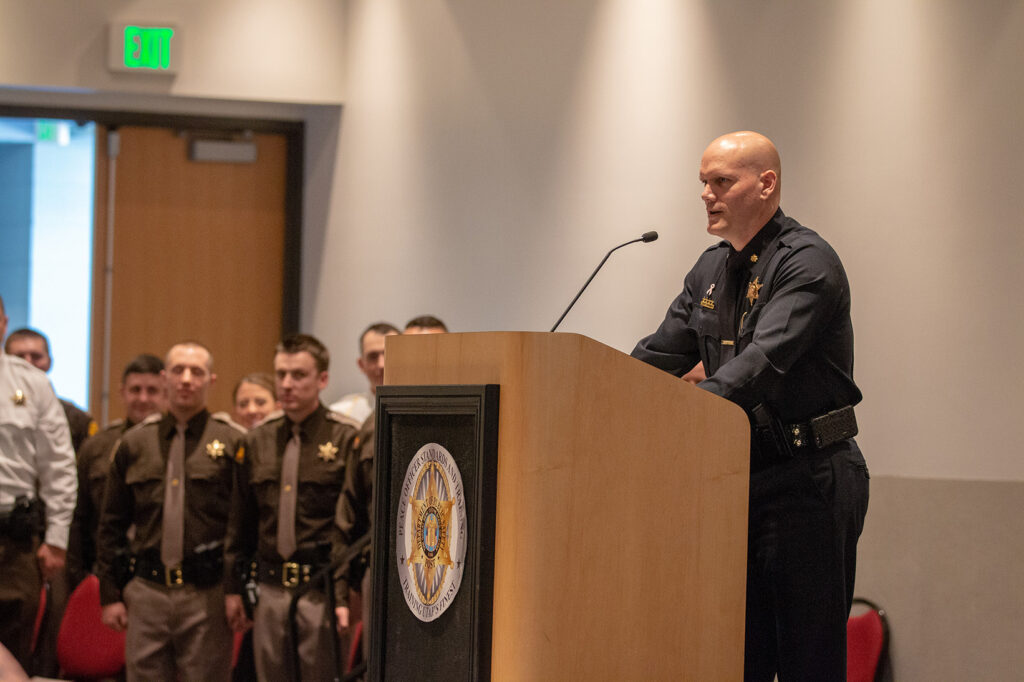
Scott Stephenson, executive director of the Utah Fraternal Order of Police and former POST director, just finished his first semester at Lynchburg University to become a licensed mental health clinician. He recognized a dire need for more trauma-informed therapists in Utah and decided to take the leap. (Utah Department of Public Safety)
Now, his days are consumed with reading, studying and taking plenty of tests. He studies for about five hours each day.
“It’s a lot of work,” he said. “It’s stretched me mentally. It’s taken me out of my comfort zone.”
But he hopes to put his 28 years of law enforcement experience to use.
“If I can help one, then I think I’ve met my goal,” he said.
“I’ve seen what they’ve gone through,” he added. “Sometimes it’s overwhelming, and so those officers need somebody that is culturally competent, that understands where they’re coming from.”
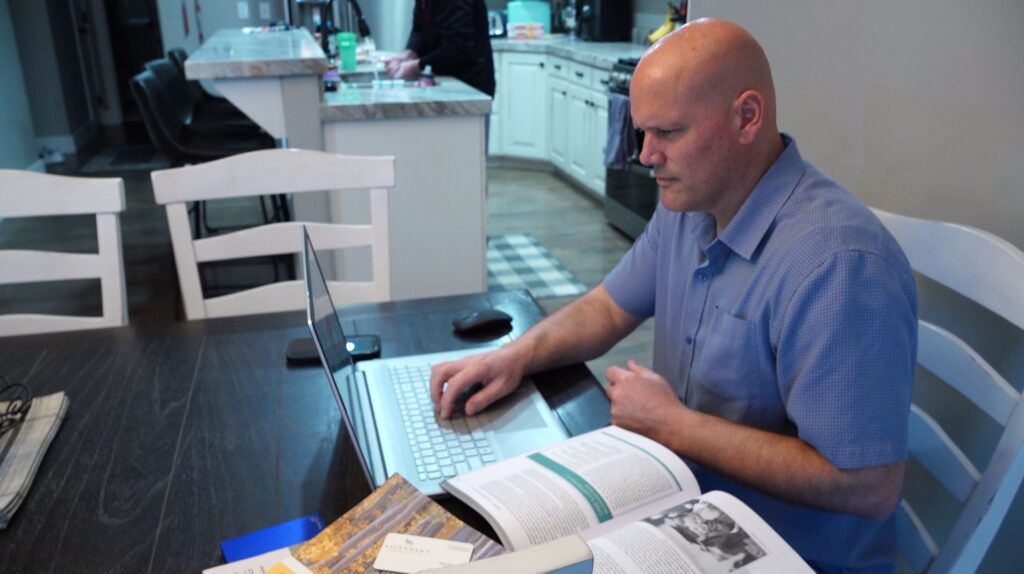
Scott Stephenson, executive director of the Utah Fraternal Order of Police and former POST director, just finished his first semester at Lynchburg University to become a licensed mental health clinician. He said his days are now filled with studying, reading and lots of test taking. He studies about five hours a day. (Josh Szymanik/KSL TV)
He believes therapy can introduce first responders to exercises that will strengthen their minds and help them feel better. Divorce, addiction and suicidal ideation are not the only options, he said.
“Therapy and counseling can prevent that from happening,” Stephenson said. “[You can work] as a nuclear family, as a unit to get through this trauma.”
When it comes down to it, Stephenson said consistency is key.
“It’s that ongoing maintenance. You can’t let it get too big,” he said. “They’ve got to communicate the way they felt, what they saw, so that they can in turn process that mentally.”
The Impact of Therapy
Mike Berg is now a big advocate for getting the help you may not know you need.
“It’s difficult to hear that your family has spent the last 14 years building that evening around the moment you walk through the door,” he said.
He initially reached out to a therapist to find support for officers in his department, not because he thought he personally needed the help.
“Because I didn’t have a problem. I didn’t need it,” he said.
But thanks to a good therapist who recognized his own needs, that quickly changed.
“At that point is when I realized that this is way deeper for me than I thought it was,” Mike Berg said.
Today, Mike Berg is a year and a half into therapy. His daughters, Madison Nunley and Makenna Berg, said it’s changed everything.
“We’ve definitely gotten a lot closer. Now, we’ll talk about anything and everything,” Makenna Berg, Mike Berg’s 17-year-old daughter, said.
Makenna Berg said she can tell he is happier now and is a better dad.
“He’ll sometimes just leave me a note out with my favorite candy. He just notices the little things and makes sure that we feel loved,” she said. “I’m also able to joke around more with my dad.”
“Even to this day, I know I could call him anytime, when before I would probably think about it,” Nunley said. “I’m just glad that he took that step and is able to be here for us.”
“I see that connection between Mike and all of us there. The connection is really big,” Melinda Berg added.
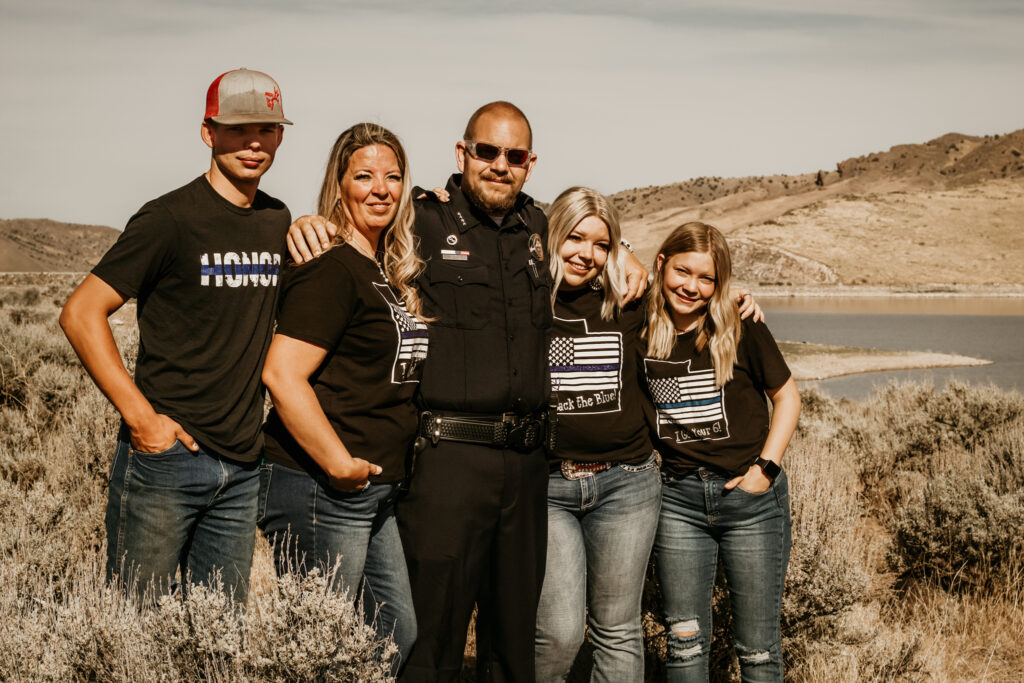
Mike Berg puts his arms around his wife Melinda, and his three kids: Madison, Mason and Makenna. After starting therapy a year and a half ago, his family said they’ve grown closer to each other, adding that their dad comes home from work much happier than he used to. (Mike Berg)
His family meets together with a therapist in a group setting to develop resiliency skills. Therapy has helped them manage their second-hand trauma.
His wife, Melinda Berg, remembers coming to the realization, with the help of their therapist, that what she’s experienced isn’t typical.
“Wow, like, it’s not normal and we’re not the only ones,” she said.
“We’ve been able to learn that together and that’s been so powerful,” Nunley said.
“The role of a first responder can be incredibly stressful on the spouse,” Denning said. “Studies have shown that the same level of post-traumatic stress that happens in the first responder happens in the spouse, who is at home as well. That secondary trauma is real.”
Therapy has also given the Berg family tools to communicate.
“Getting the empowerment for them to say, ‘Hey, wait a minute dad. I need you to listen,” Mike Berg explained. “And when she says that, I know it’s important. We need to sit down. We need to listen.”
“We now have our 17-year-old daughter who is more vocal with things with him, and I love it because he’s willing to hear it,” Melinda Berg added.
Mike Berg is also now willing to open up about his day with his family.
“My kids thrive on, “OK, dad, we don’t need all the details, but like, what happened today? What intrigued you?” Melinda Berg said.
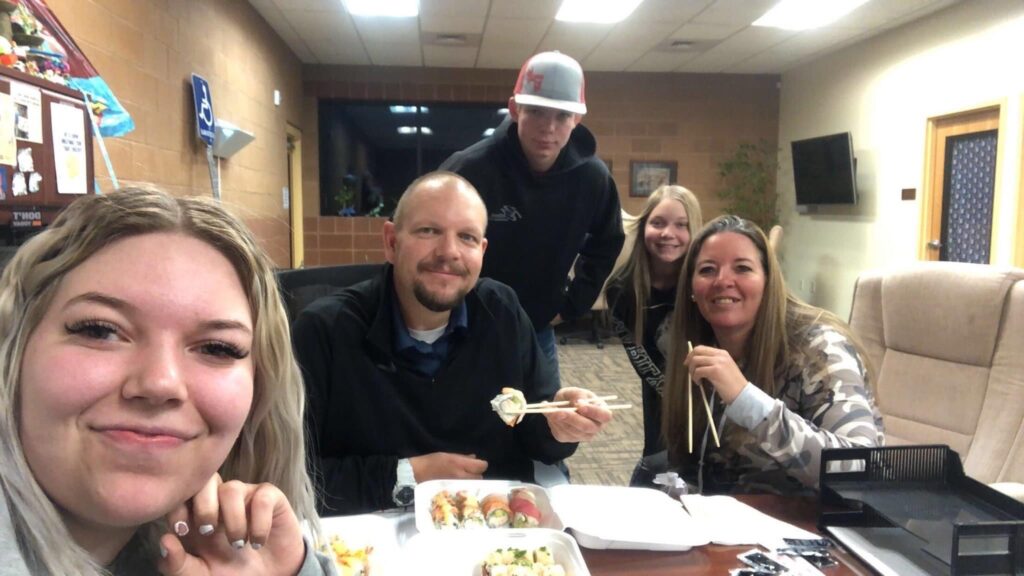
After Mike Berg started therapy to work through some of the trauma and stress brought on by the strain of his job as a police officer, the Berg family said they are so much closer and can now talk about anything and everything. (Madison Berg Nunley)
With encouragement from their therapist, the Berg family decided on a family mantra that holds special meaning to them. They use that mantra when they want each other to feel extra recognition from each other on hard days or to gain the attention of another when they need more support.
Mike Berg admits therapy has forced him to deal with emotions he’s never before experienced, like anger and anxiety.
“It becomes easier, but it’s not easy,” he said. “Now, I’m allowing myself to understand what’s been hiding for all those years.”
Now, it’s Mike Berg’s mission to help other police chiefs, sheriffs, EMS directors and fire chiefs understand the value of therapy and its integral role in helping first responders and their families heal.
“If a chief will deal with his own crap first and be a little bit vulnerable to his troop, they will follow,” he said. “I believe if we teach them resiliency now, they won’t suffer the consequence of their career later. I don’t want anybody else to suffer what I suffered.”
He urges other first responders to put their own families first.
“Every first responder out there is doing it for their community because they have a love of serving others. Why wouldn’t you serve your family first?” he said.
Nunley is on her own path to becoming a therapist for first responders, despite initial frustration from her dad.
The thought of his own daughter being exposed to the types of things he had shared with his therapist scared him. But once Mike Berg understood the impact she could have on other first responders because of her own experience growing up in a first responder’s home, he put his full support behind her.
She hopes her own experience can help others in her shoes.
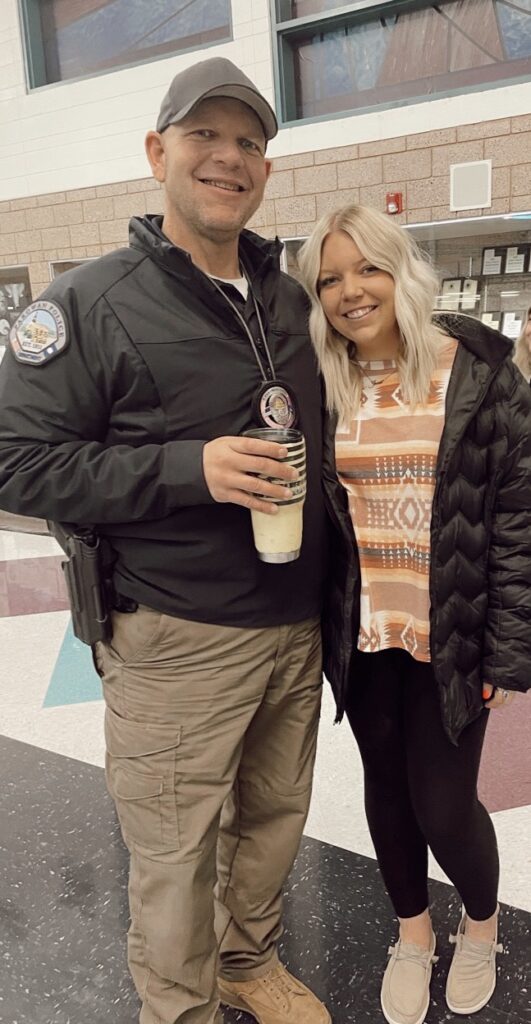
Mike Berg poses with his oldest daughter, 22-year-old Madison Berg Nunley, who is on track to become a therapist herself for first responders. She just finished her undergraduate degree in social work and family services and hopes to pursue a master’s degree to obtain her licensed clinical social worker licensure. She believes her experience growing up in the home of a first responder will give her the ability to relate with other first responders. (Madison Berg Nunley)
Scholarship funding for this law goes into effect in July for those interested in pursuing a degree in mental health counseling.
Additional Resources
The state provides another resource outside of one-on-one therapy with the goal of helping first responders cope.
The Utah Critical Incident and Stress Management team is comprised of a group of mental health professionals and peer support personnel who are trained to help first responders deal with the stress of their profession. They provide crisis intervention after critical incidents through group debriefings, typically 24-48 hours after the incident.
Denning, chairman of the team, said it allows those involved to talk about what emotions and thoughts crossed their minds while on the scene or afterward.
“Hey, you know what really bothered me about this incident? Well, it was the fact that I felt helpless. I couldn’t do anything to save that kid,” Denning said. “And then other people will say, ‘You know, I kind of felt the same way.’ And so it normalizes things, and it allows people to express themselves in ways that they get it.”

Jeffrey Denning is training members of the Tooele County Dispatch on mental wellbeing. Denning conducts trainings on behalf of his organization, First Responders First, with agencies across Utah to help first responders cope with the stress of their profession and to identify more critical needs. (Josh Szymanik/KSL TV)
Mike Berg has also been a member of this team for 12 years.
“Most officers don’t think about that stress while they’re there. They just go and do because that’s what their job is,” he said.
These debriefings allow first responders time and space to appropriately address their emotions and find healing.
The SafeUT Frontline app is another resource available to all first responders and their families to connect to a licensed mental health professional trained to understand their unique challenges.
The Utah State Fraternal Order of Police will offer two free therapy sessions to any police officer, even if they aren’t a member, and four therapy sessions a year for FOP members.
For anyone in immediate crisis, call or text 988.
Suicide prevention resources
If you or someone you know is experiencing suicidal thoughts or exhibiting warning signs, call, text, or chat the 988 Suicide and Crisis Lifeline at 988 which is answered 24/7/365 by crisis counselors at the Huntsman Mental Health Institute. All calls to legacy crisis hotlines, including the old National Suicide Prevention hotline, 1-800-273-8255, will also connect to a crisis care worker at the Huntsman Mental Health Institute as well.
Additional resources
- SafeUT: Parents, students, and educators can connect with a licensed crisis counselor through chat by downloading the SafeUT app or by calling 833-3SAFEUT (833-372-3388)
- SafeUT Frontline: First responders, including firefighters, law enforcement, EMS, and healthcare professionals can chat with a licensed crisis counselor at no cost 24/7/365 by downloading the SafeUT Frontline app.
- SafeUTNG: Members of the National Guard can chat with a licensed crisis counselor at no cost 24/7/365 by downloading the SafeUTNG app.
- Utah Warm Line: For non-crisis situations, when you need a listening ear as you heal and recover from a personal struggle, call 1-833 SPEAKUT 8:00 a.m.-11:00 p.m., 7 days a week, 365 days a year.
- The Huntsman Mental Health Institute offers a wide variety of programs and services including suicide prevention and crisis services, hospital treatment, therapy & medication management, substance Use & addiction recovery, child & teen programs, and maternal mental health services including birth trauma, pregnancy loss, infertility, and perinatal mood and anxiety disorders.
- LiveOnUtah.org is a statewide effort to prevent suicide by promoting education, providing resources, and changing Utah’s culture around suicide and mental health. They offer resources for faith-based groups, LGBTQ+, youth, employers, firearm suicide prevention, and crisis and treatment options.
Other community-based resources
- NAMI Utah provides education, support and advocacy for individuals and families impacted by mental illness.
- American Foundation for Suicide Prevention offers prevention programs, public education, support for loss survivors, and fundraising for research.
- Encircle Utah: LGBTQ+ family and youth resource center.
- Utah Pride Center empowers Utah’s diverse LGBTQ+ community.
- The Trevor Project: LGBTQ teen resource center.
- U.S. Department of Veterans Affairs Mental Health
- Latino Behavioral Health Services
- Center for Workplace Mental Health offers suicide prevention and response for employers.




